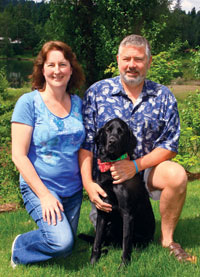Rectal Cancer Survivor
Survivor now focuses on good health and helping others
 Tom Foeller lives in a suburb near Portland, Oregon, with his wife, Meri, and their devoted dog, Seco. After being diagnosed in 2006 with stage III rectal cancer, Tom embarked on a grueling year of treatment, and retired early from Bonneville Power Administration, where he was a supervisor.
Tom Foeller lives in a suburb near Portland, Oregon, with his wife, Meri, and their devoted dog, Seco. After being diagnosed in 2006 with stage III rectal cancer, Tom embarked on a grueling year of treatment, and retired early from Bonneville Power Administration, where he was a supervisor.
Tom is now using his retirement years to fulfill a number of personal dreams — venturing into open water sailing and spending more time with his and Meri’s four grown children and two grandchildren. He is also committed to serving others and is an active board member in his local community council and sewer district. In addition, he was recently appointed by Fight Colorectal Cancer (Fight CRC) as the Regional Director of Western States, and he has visited members of the US Congress as an advocate for Fight CRC.
In my heart of hearts, I knew I should have had a colorectal exam much earlier. When I was actually tested, however, I was virtually asymptomatic although, I had some irregular bowel movements which I attributed to diet and growing older. It wasn’t avoidance; I was just busy with the pressure of my work, managing and supervising. Now I know that your health has to be a priority.
I was 59 when, during a routine physical, I had to ask my family physician if I needed a colon exam. The sad part was that while I was ignorant about the test, it had never been on his radar screen either. He gave me a fecal occult test in the exam room that took all of five minutes, and he proceeded to order a colonoscopy. I subsequently realized he found blood in my fecal matter.
Within a month, I had my first colonoscopy. I was semi-conscious during the procedure but remember a female attendant uttering something profane almost right off the bat —so I knew something was up.
Meri and I then met with the surgeon to discuss the results. He told me I had a large cancerous tumor in my rectum that was treatable, but that would require surgery. At this juncture, like most newly diagnosed cancer patients I wanted to ask, “How long do I have to live?”
The appointment with my oncologist followed, with the explanation that the treatment would last a year or so. He also recommended that I participate in a research study. After Meri and I discussed it, I agreed to enroll in the NSABP’s (National Surgical Adjuvant Breast & Bowel Project) R-04 study. I thought it might increase the oversight of my care and help me learn more about the disease. As it turned out, I was right. The research nurse helped interpret important details, and the results of the trial should be helpful to other patients in the future.
I was “randomized” into one of four groups and assigned oral chemotherapy. So I started six weeks of chemo and radiation together. Initially the treatment was a cake walk, but toward the end, I had a number of painful side effects.
Once that was completed, my surgeon removed the tumor by performing a lower resection of the rectum, and I had to get used to the temporary external ileostomy bag. Thank God and the doctor, six weeks later, my surgeon closed the ileostomy, and shortly afterward, my “waste” system began working again.
I then started five months of adjuvant treatment that included oral medication and infusions. The side effects were not pleasant, but they always beat the alternative! I choked on pills, my bowel movements were messy and unpredictable and I was producing more gas than Exxon.
After completing the chemo, I slowly began to recover and get my energy back. I continued to experience tingling in my feet and hands; however, over time it became more manageable. Some bowel irregularity also persisted, but the successful results of chemotherapy, radiation and surgery were worth it all.
When I was diagnosed with cancer, I thought I had just received a death sentence. As time passed, hope began to build, and I realized not all cancer pronouncements mean your life is over. My inspirations were virtually everyone around me: Meri, other patients, medical staff, family, our kids, grandkids and friends were all pulling for me.
Recently, my doctors gave me the excellent news that five years after my first surgery, I thankfully remain cancer free. In retrospect, my disease introduced me to a new and fulfilling world, and the timing and circumstances were perfect. It helped me launch another period in my life — one where we’re doing all the things we like, and I hope in return that I can help others fight this highly preventable, treatable and beatable disease.


